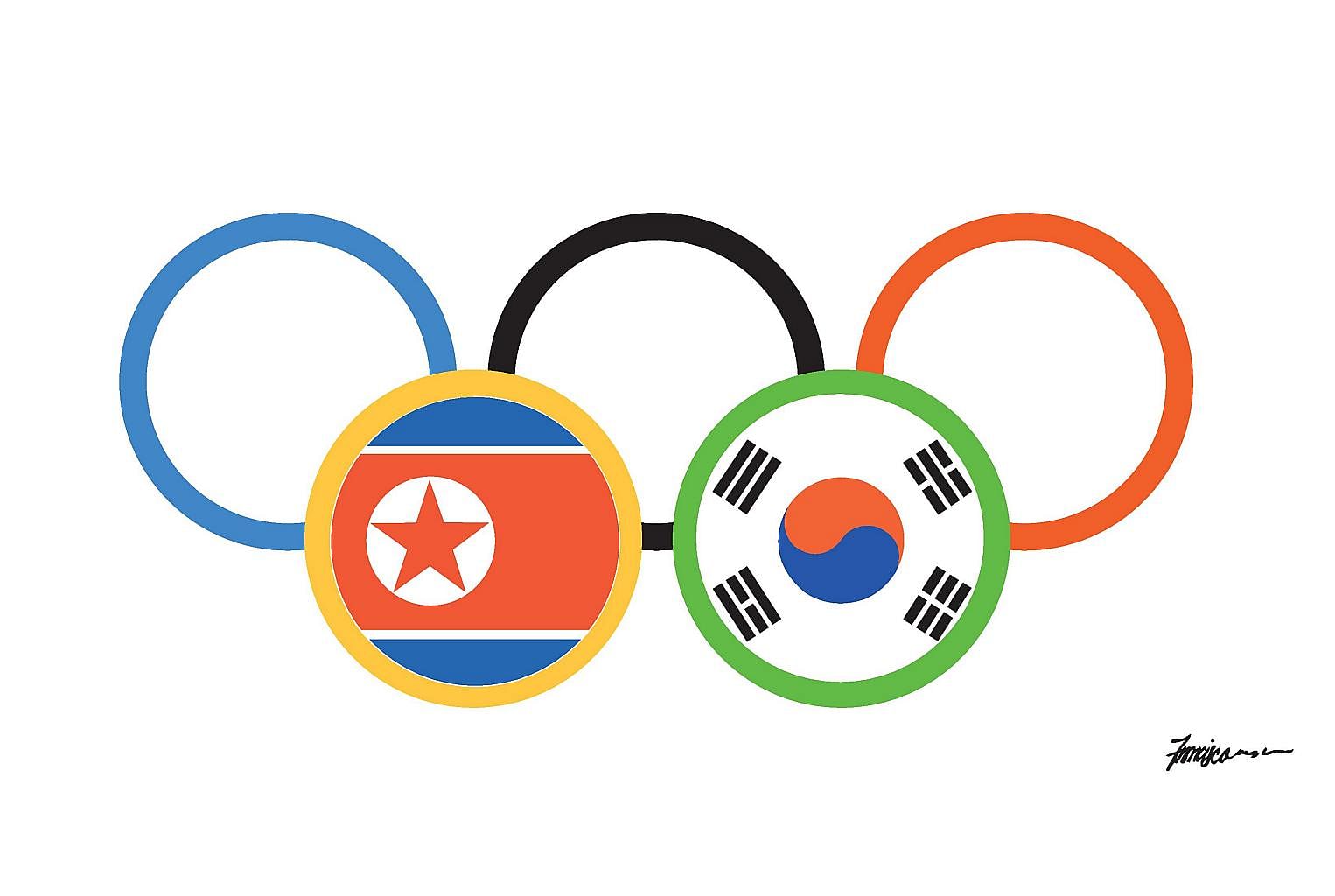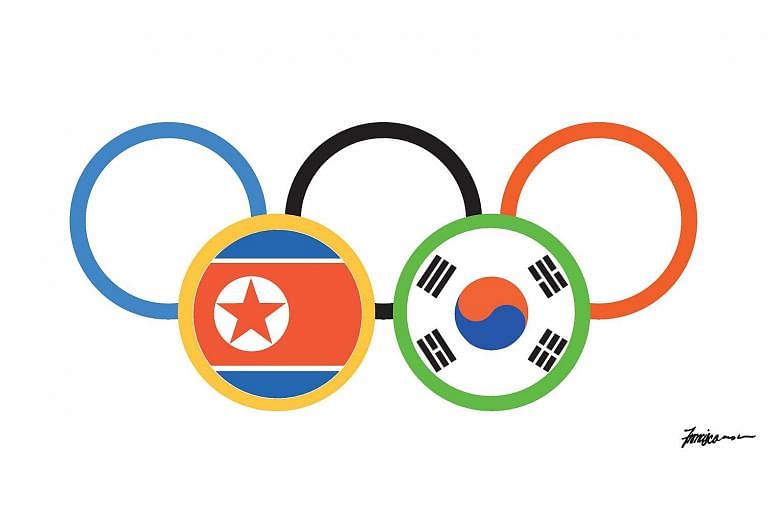The event was supposed to be purely about sport, but the Pyeongchang Winter Olympics will surely go down in history for its politics.
The North and South Korean teams marching in unison, under a blue-and-white all-Korea generic flag, to emotional applause from everyone. Then, there were those North Korean cheerleaders whose undoubted enthusiasm certainly made up for their bizarre chants and odd rhythmic routines.
But above everything else, there was Ms Kim Yo Jong, the sister of the North Korean leader, who won plaudits for just proving that members of the Kim dynasty can, occasionally, talk to mere mortals and do - ever so rarely - even smile. There was little subtlety about the way she used the Olympics venue for politics; Ms Kim explicitly fused sports and politics into one.
For the uninitiated, the Pyeongchang Games seem praiseworthy, a historic turning point that averted a potential nuclear confrontation, holding the promise of resolving one of the world's longest and most intractable security crises.
Yet the reality is that the Olympic Games and politics were inseparably linked from their inception and were regularly used by various governments for political purposes; what the North and South Koreans have just done is, therefore, not the exception but the rule.
Less encouragingly, however, it is equally true that most attempts to use sports for politics have resulted in abysmal failures, justifying neither the effort nor the money expended. And so it is almost certain to be the case on the Korean peninsula.
Much of what we know about the old Games that flourished in ancient Greece between 2,500 and 1,700 years ago are either myths or suppositions. It is not true, for instance, that all wars between Greece's city-states were suspended during the Games. It may or may not be true that religious pilgrims travelling through Olympia during the Games were offered special protection.

And it is possibly true that the Games were held every four years, with the participation of all the states of the Hellenic world then.
NATIONAL GLORY
But what is unquestionably true is that the modern Olympics, revived in the late 19th century, were all about politics. The very idea of reviving the Games was inextricably linked to Greece's own national rise as an independent state by shaking off Turkish occupation.
With a few minor exceptions right at their beginnings, the modern Olympic Games have always been competitions between states; the opening and closing ceremonies with their parades of national flags, the award ceremonies with the playing of the national anthem of the gold medal winner's country, as well as the tiered arrangement of the hoisting of the flags, with the gold medallist's flag coming on top of others, are all intended to underline the fact that this is a competition between nations.
Only citizens of internationally recognised nations can compete in such events; just ask the athletes of Taiwan, who can appear only because they agreed to compete under a flag nobody would recognise and the name of "Chinese Taipei", which is a fiction. Until fairly recently, athletes who were stateless for one reason or another were simply turned away; just ask the East European refugees during the Cold War.
Nor is there any secret that countries fall over themselves to host the Olympic Games and are prepared to spend tens of billions of dollars on such efforts because they crave the exposure and the temporary glory that goes with it.
Japan hosted the 1964 Olympics because the country wanted to tell the world that it had finally joined the ranks of industrialised, prosperous nations. Mexico also sought to project itself as a rising nation by hosting the subsequent Games in 1968, as did Germany in 1972, South Korea in 1988 and, most famously, China in 2008.
Countries also often miss participation in the Olympics for political reasons. The nations defeated in World War I were simply not invited to the 1920 and 1924 Games. Many national Olympic committees recall with shame their decision - controversial even at that time - to attend the 1936 Summer Games in Nazi Germany.
More recently, Western nations led by the United States refused to show up in Moscow when the Soviet Union hosted the 1980 Olympics, and the Soviets with their allies retaliated by boycotting the subsequent Games held in 1984 in Los Angeles.
POSITIVE OUTCOMES
Despite their charged and highly politicised history, the Olympics can sometimes produce very beneficial political outcomes. One such achievement is the promotion of gender and racial equality of opportunities. Uniquely, women's participation in the Olympics started in 1900, a time when they could not vote or even file a tax return form without their male "guardian".
It took many more decades before women competed across the board in all sport disciplines, but the pressure to allow women to participate in the Games played a key role in providing opportunities for female athletes worldwide; for the first time ever, at the London Games of 2012, all the world's teams included women, and Qatar created an additional precedent by becoming the first Gulf state to have a woman as its flag-bearer.
It was also the Olympics which dispelled myths of "racial superiority". The case of Jesse Owens, the long-jump Afro-American athlete who won gold for the US at the 1936 Olympics, thereby making a mockery of Nazi racial "theories", is famous. More poignant still are the stories of Karoly Karpati and Endre Kabos, two Jews representing Hungary, who also won gold in the 1936 Olympics; Kabos paid for this with his life since the Nazis killed him during World War II.
Later on, it was also the Olympics which isolated apartheid South Africa, and helped bring about the eventual collapse of the racial regime in that country.
Yet apart from these political outcomes, which were often unintended or accidental, those who played politics with the Olympics were usually disappointed, since they did not get the outcome they banked on. Both Mexico and South Korea were ruled by one-party dictatorships when they hosted the Olympics, and both hoped to burnish their images as a result. Instead, the Olympics helped unleash domestic movements that swiftly removed the authoritarian leaders of both countries from power.
OVERHYPED HOPES
The Soviet Union and its communist allies spent fortunes on training and drugging their athletes to collect as many Olympic medals as possible. Russia is banned today from competing as a country in the Olympics because of similar practices. Did the Soviet communist system thrive as a result of collecting many medals? And is Russia today benefiting from a better image as a result?
The Chinese have learnt from Russia's failures. Despite trying hard, China has never succeeded in topping the league of overall medal winners at any Olympics, and managed only once - in the Beijing Games - to overtake the US in the number of gold medals collected. More recently, the Chinese medal tally has slipped even further. But this had zero impact on the global perception of China as a successful power, which seems to be rising in inverse proportion to the medal count. In short, the political usefulness of Olympic glory is grossly overhyped.
And so it may prove in the current case of the Koreas. This is not the first time the two Koreas have marched united at the Olympic Games; the same happened in the 2000 Summer Games in Sydney, and the 2004 event in Athens.
On all previous occasions, everyone claimed that the sight of the two teams together was "historic" and many prophesied a speedy reconciliation. Of course, nothing of the kind happened, and the problem facing previous South Korean leaders is the same as the one confronting South Korean President Moon Jae In now: how to avoid ending up being pilloried for the diplomatic chill that will invariably follow the current supposed glow from the Games.
For there is nothing - apart from atmospherics - to indicate that this is the moment of a diplomatic breakthrough on the Korean peninsula.
Apart, of course, from the august presence of Ms Kim Yo Jong. Who did smile. More than once, actually.


